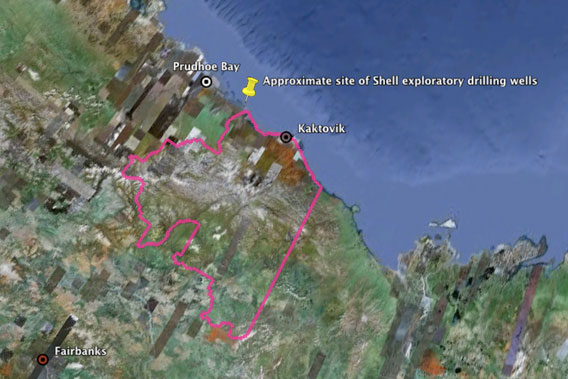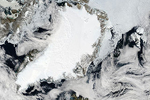
Approximate site of preliminarily approved drilling by Shell. Pink outline is the Arctic National Wildlife Refuge (ANWR). Image made with Google Earth.
Following the Obama administration’s approval of Royal Dutch Shell to drill in the Arctic’s Beaufort Sea, a wide-swathe of environmental have filed a lawsuit to stop the drilling, which could begin as early as next summer. Those filing the lawsuit today blasted Shell for what they perceived as a pathetic oil spill response plan, and the Obama administration for acquiescing to the big oil company.
“If you liked the Deepwater Horizon oil spill, you will love Shell’s plan for Alaska,” said Mike Daulton with the National Audubon Society, one of the plaintiffs, in a press release. “Shell has never demonstrated the ability to effectively clean up a large oil spill in the Arctic Ocean. In addition to the usual problems handling a major spill, Alaska has huge ocean waves, gale force winds and widespread sea ice. A major oil spill in Alaska would be Deepwater Horizon meets the Titanic.”
However, Curtis Smith, a spokesperson with Shell Alaska, told the Associated Press that the company could handle an oil spill in the Arctic.
“We feel we have put in place the most technically sound, environmentally sensitive plan of exploration in the history of North America. Our confidence in making a statement like that is informed by our history in Alaska, the planning we have done, the unprecedented oil response plan, and the addition of a capping and containment system very much like the one that ultimately ended the blowout in the Gulf of Mexico,” he said.
Shell’s plan, in which it has already invested 3.5 billion, is to begin exploratory drilling offshore just north of the western edge of the Arctic National Wildlife Refuge (ANWR) in the Beaufort Sea, home to bowhead and beluga whales, seals, walruses, polar bears, and a wide variety of migrating birds.
In July Admiral Robert Papp, top officer with the US Coast Guard, said that if a spill occurred in the area, the Coast Guard lacked the infrastructure and equipment needed to deal with it.
“If this were to happen off the North Slope of Alaska, we’d have nothing,” said Papp, as reported by Platts. “We’re starting from ground zero today.”
Along with environmental groups, local indigenous groups have also come out against Shell’s plan.
“We have a right to life, to physical integrity, to security, and the right to enjoy the benefits of our culture. For this, we will fight, and this is why we have gone to court today. Our culture can never be bought or repaired with money. It is priceless,” Caroline Cannon, president of the Native Village of Point Hope, said in a press release.
Just over a year since the Deepwater oil spill in the Gulf of Mexico, the Obama administration has been quietly opening up offshore drilling again along the US’s coastlines. The US consumes more oil than any other country in the world, and has long focused on raising production (the Obama administration has raised production significantly), instead of increasing efficiency and lowering consumption overall. Now, rapidly melting summer ice due to climate change is opening up long-closed off areas—sea ice this summer was the second lowest on record— of the Arctic and providing the US and other nations with a new source of oil. However, many environmentalists warn that the Arctic melt should be seen as a warning of global dependence on fossil fuels and not an opportunity to burn more, thereby exacerbating the warming that is already overturning the Arctic’s fragile ecosystems.
Related articles
Shell spills over 50,000 gallons of oil off Scotland
(08/16/2011) Yesterday, Royal Dutch Shell estimated that to date 54,600 gallons of oil had spilled into the North Sea off the east coast of Scotland, spreading some 19 miles wide (30 kilometers) at its maximum. While the company stopped the initial leak on Thursday, it has now announced that the oil has found a ‘second pathway’ and is still leaking into the sea around 84 gallons a day.
Arctic open for exploitation: Obama administration grants Shell approval to drill
(08/08/2011) Less than a year and a half after the oil spill in the Gulf of Mexico, the Obama administration has bucked warnings from environmentalists to grant preliminary approval to oil giant, Royal Dutch Shell, to drill off the Arctic coast. Exploratory drilling will occur just north of the western edge of the Arctic National Wildlife Refuge (ANWR) in the Beaufort Sea, home to bowhead and beluga whales, seals, walruses, polar bears, and a wide variety of migrating birds.
Activists worldwide push for leaving the fossil fuel age behind

(09/25/2011) On six continents, in over 75 percent of the world’s countries, people came out en masse yesterday to attend over 2,000 events to demonstrate the power of renewable energy to combat global climate change. As apart of the ‘Moving Planet’ campaign organized by 350.org, activists created a giant human-windmill in Paris, gave out bike lessons in Buenos Aires, practiced evacuation measure in the Pacific island of Tuvalu imperiled by rising sea levels, and marched in Cape Town for a strong agreement at the next UN climate meeting hosted in Durban, South Africa.
Greenpeace head arrested after nonviolent protest on Arctic oil rig

(06/19/2011) Kumi Naidoo, the head of Greenpeace, has been arrested after scaling a deepwater oil rig in the Arctic run by Cairn Energy. Naidoo was attempting to deliver a petition to the captain signed by 50,000 people demanding that Cairn Energy release details on how it would respond to an oil spill. “For me and for many people around the world this is now one of the defining environmental struggles of our time,” Naidoo said on a video before scaling the rig. “It’s a fight for sanity against the madness that sees the disappearance of the Arctic ice not as a warning, but as an opportunity to seek further profits.”
Oil horror in Nigeria: 30 years, one billion dollars to clean-up
(08/08/2011) Fifty years of oil spills in Nigeria’s now infamous Ogoniland region will take up to three decades and over a billion dollars ($1 billion for just the first five years) to restore environments to healthy conditions, according to a new independent report by the United Nations Environment Program (UNEP). The most thorough study to date has found that widespread pollution has hit the Niger Delta even harder than assumed with devastating impacts on fishing grounds and community health. Last week Shell, one of the biggest operators in Nigeria, admitted to two massive oil spills in 2008 totaling 11 million gallons of crude.
Russia and Norway carve up wildlife-rich Arctic sea for fossil fuels
(06/09/2011) As climate change melts the Arctic sea ice, nations are rushing to carve up once-inaccessible areas for oil and gas exploitation, industrial fishing, and shipping routes. Now, BBC reports that Russia and Norway have essentially agreed to split the Arctic’s Barents Sea in half —one of the region’s richest in biodiversity and ecological productivity—for industrial exploitation.
Arctic on the line: oil industry versus Greenpeace at the top of the world

(06/06/2011) At the top of the world sits a lone region of shifting sea ice, bare islands, and strange creatures. For most of human history the Arctic remained inaccessible to all but the hardiest of peoples, keeping it relatively pristine and untouched. But today, the Arctic is arguably changing faster than anywhere else on Earth due to global climate change. Greenhouse gases from society have heated up parts of the Arctic over the past half-century by 4-5 degrees Fahrenheit, leading to a staggering decline in the Arctic sea ice. The large-scale changes suffered by the Arctic have created a new debate over conservation and exploitation, a debate currently represented by the protests of Greenpeace against oil company Cairn Energy, both of whom have been interviewed by mongabay.com (see below).













